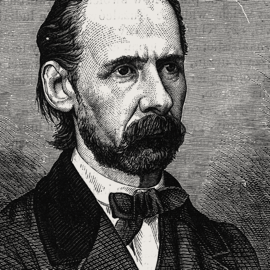Antoni Pietkiewicz (pseud. Adam Pług)

Antoni Pietkiewicz (1823–1903) was a poet, a prose-writer, an editor of literary journals (Kłosy, Wędrowiec, Kurier Warszawski) and also the general editor of the Great Illustrated General Encyclopedia (Wielka Encyklopedia Powszechna Ilustrowana), a well-known and esteemed figure in the literary circles of Warsaw. He worked on translations of three Shakespeare plays – The Tempest (Burza), King Lear (Król Lear) and Macbeth (Makbet) – during the most tragic period of his life, namely the years following the defeat of the January Uprising (1863). This event split his life into two parts, of which the first, full of great hope and personal drama, unfolded in the eastern borderland region known as the Kresy, whilst the second, industrious and painstaking, took place in Warsaw.
For Pietkiewicz, translating Shakespeare was a way of escaping from personal difficulties, as well as an attempt to find a new literary path. Cut off from the world in the provinces, he had a limited knowledge of what was happening elsewhere, and produced what he thought were initial translations of certain plays, intended to introduce them fresh to Polish literary culture. His work was out of touch with current theatrical conventions, and he translated by the lights of romantic poetic norms that were already out of fashion. He translated the prose and the blank verse into rhymed 13-syllable lines, spicing them up with certain ludic elements, which now serve as an interesting take on the folklore of the Kresy.
Pietkiewicz’s escapist and heroic literary endeavours met with some appreciation from literary journals, where his translations of Shakespeare appeared in 1868–1871, allowing him to continue his career in Warsaw. Contemporary reviews praise the fluency, music and linguistic accuracy of his work, but the plays were not published as a book. Pietkiewicz’s translations were not staged.

Bibliography of translations
[William Shakespeare], Burza. Dramat Szekspira, przełożony z oryginału, tłum. Adam Pług [Antoni Pietkiewicz], „Kłosy” 1868 T. 6, nr 132, s. 22–24; nr 133, s. 30–32; nr 134, s. 42–43; nr 135, s. 54–55; nr 136, s. 70–71; nr 137, s. 86–88; nr 139, s. 117–119; nr 140, s. 130–131; nr 142, s. 161–163; nr 143, s. 177–178.
[William Shakespeare], Król Lir. Tragedja Szekspira w pięciu aktach, przetłumaczona wierszem rymowym, tłum. Adam Pług [Antoni Pietkiewicz], „Tygodnik Mód i Powieści” 1870 nr 41, s. 1–4; nr 42, s. 1–4; nr 43, s. 1–3; nr 44, s. 2–4; nr 45, s. 2–4; nr 46, s. 5–6; nr 47, s. 1–3; nr 48, s. 4–6; nr 49, s. 6–7; nr 50, s. 5–7.
[William Shakespeare], Król Lir. Tragedja Szekspira, tłum. Adam Pług [Antoni Pietkiewicz], „Mrówka” 1870, z. 1, s. 24–29; z. 2, s. 51–54; z. 3, s. 81–85; z. 4, s. 111–124; z. 5, s. 153–169.
[William Shakespeare], Król Lir. Tragedja Szekspira w 5 aktach, tłum. Adam Pług [Antoni Pietkiewicz] Wydawnictwo Mrówki, Lwów 1870.
[William Shakespeare], Makbet. Tragedya Szekspira, przełożona z oryginału, tłum. Adam Pług [Antoni Pietkiewicz] „Kłosy” T. 12: 1871 nr 312 s. 390–392; nr 313, s. 407–408; T.13 nr 314, s. 12–13; nr 315, s. 19–23; nr 316, s. 47–48; nr 318, s. 78–79; nr 319, s. 94; nr 320, s. 106–108; nr 321, s. 122–124; nr 322, s. 138–140.
